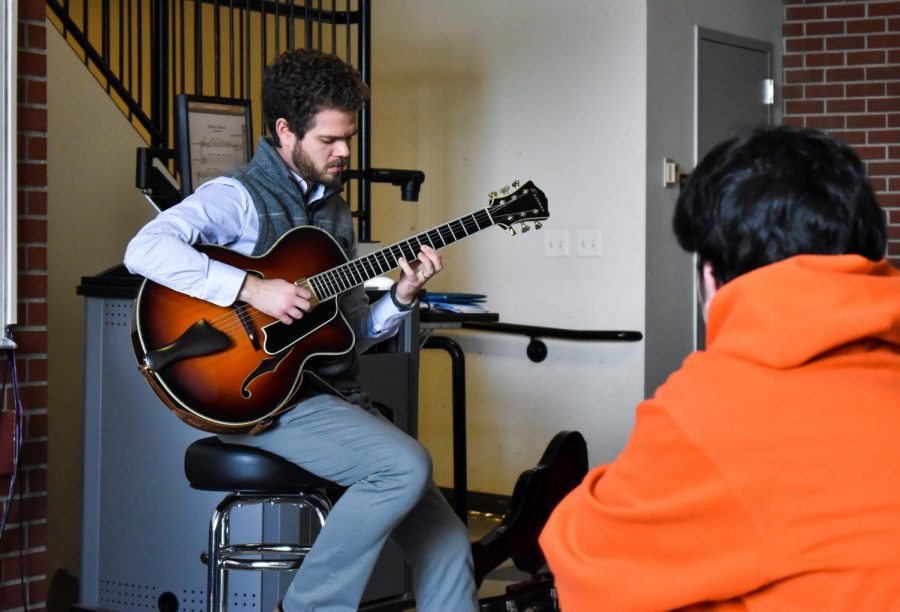Professors protect against ‘Zoom bombing’
Some teachers began using passwords, making meetings private to block online trolls
Gabriel Condon, instructor of classical and jazz guitar, plays a song for his students at the beginning of his Music 120 class September. 2019 morning in Kimbrough 115.
April 30, 2020
When Gabriel Condon put together a Songwriters Roundtable, he expected the event to be an opportunity for musicians around the WSU campus to share their music. What he did not expect was for his meeting to be the target of Zoom bombing.
Condon, instructor of classical and jazz guitar, said within 15 minutes, several random people started joining the call. The people took over the screen and yelled racial slurs at those in attendance.
To get the trolls out of the meeting, Condon said he had to end the session and start a new private meeting without the public audience.
Condon said he had to make the second Songwriter’s Roundtable Zoom meeting private to protect from the online trolls, but decided to stream the meeting on YouTube to allow the community to join in.
“When we’re faced with challenges like this, it just calls for more creativity and persistence,” he said. “I’m really happy that we were able to have a really successful Songwriters Roundtable.”
Reports of Zoom bombing incidents have caused many teachers to set up more restrictions on their Zoom lectures.
William Loftus, communication professor, said he locked down his Zoom lectures as much as possible to combat his worries of Zoom bombing.
Loftus said he disables the chat and mutes everyone. When students have questions, they post them in a Blackboard discussion forum and wait for his response.
“It’s not ideal, but this is a writing class,” he said. “I feel there is some value in thinking through a question and putting it in writing.”
Sasi Pillay, vice president of information technology services, said teachers can minimize any safety risks by having a password on each meeting and setting up screen sharing so the professor is the only one able to screen share.
The biggest change made to Zoom to combat Zoom bombing issues was the default control setting. Zoom had the controls free for the meeting organizer to set up when it was originally released. After receiving reports of Zoom-bombing, Zoom now sets up specific safeguards by default.
Pillay said WSU reported only one case of Zoom bombing since Zoom changed their control settings. Before the change, there were about a dozen reported cases.
Loftus said students and professors should still use Zoom for their lectures despite the safety concerns.
“It is the best program out there that I’ve used,” he said. “I’ve been on three different platforms and Zoom seems to be the easiest one to work with.”
Pillay said WSU has no intention to stop using Zoom, but there are backup plans in case Zoom cannot be made safer.
“We have no intention of switching because we are confident we have secured the Zoom environment and can make it safer,” he said. “We’re always looking around the corner with every service, we’re constantly evaluating alternatives.”










